Blog
Meet a Resident: Rena Priest
Rena Priest of Bellingham, Washington, writes poetry, fiction, and creative non-fiction. She holds an MFA from Sarah Lawrence College, and has taught various topics in writing and the humanities at Western Washington University, Northwest Indian College, and Fairhaven College. Her poetry chapbook, Patriarchy Blues, was recently published by Moonpath Press. She was a resident at Mineral School during October 2017, one of the “parent residents” attending shorter-form residencies supported by the Sustainable Arts Foundation.
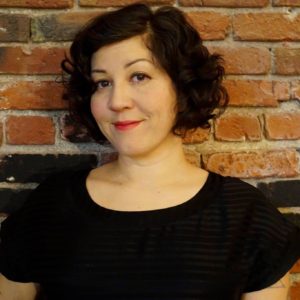 You just launched Patriarchy Blues with MoonPath Press. Tell us about the wonderful title, your favorite poem in the book, and how this book came to be?
You just launched Patriarchy Blues with MoonPath Press. Tell us about the wonderful title, your favorite poem in the book, and how this book came to be?
I’m very excited to have this book out on MoonPath, and I’m happy to see what it has turned into. The project wasn’t working until the title revealed itself, and how that happened was, a few years ago my teenage daughter was participating in the Bellingham Girls Rock Camp and I was teaching Comparative Cultural Studies at the university, so while I was teaching about systems of oppression, my daughter was learning how to use her voice and learning all about the patriarchy from this amazing group of rock n’ roll women.
Whenever anything sucked beyond our control and could legitimately be attributed to the patriarchy we’d just say, “Ugh. It’s the patriarchy. Bummer. Stupid patriarchy.” Maybe it sounds pessimistic, but it was really a very empowering practice, because by calling out the inequities in the system in which we operate we’re no longer internalizing and taking responsibility for things that don’t work when really they’re not designed to work for us. It helps us move past obstacles quicker and try a new way.
Anyway, my daughter’s interest shifted from rock and roll to jazz and she would always tell me about things that these jazz musicians said, and one day she quoted Duke Ellington who said, “I merely took the energy it takes to pout and wrote some blues.” It struck me instantly that this is what this collection was. And then I thought, what am I pouting about? ‘The stupid patriarchy.’ The poems in this collection are an expression of the low-down-dirty, patriarchy blues.
My favorite poem in the book is one of the very last poems I wrote for it, and it’s the very first poem in the book. It’s called, “Toward a Beautiful Flare of Ruin.” The title comes from a passage in Donna Tartt’s amazing book, The Goldfinch. It responds to the question of what do you do when your heart can’t be trusted to lead you in the right direction. This is a deep question for me, because how much of what I want is what I’ve been conditioned to want by family and society (the patriarchy)? And even beyond that how much is a reaction to biology or spiritual need, and even beyond that, how do my reactions to these wants shape my life?
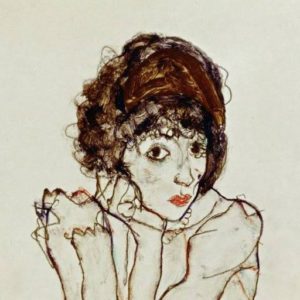
These questions are at the root of how the book came to be. I started writing these poems while I was living in New York and working in this whimsical retail shop in Rockefeller Center. Arriving at work in the old theater that was remade to be a theatrical retail space, I always felt like I had entered the world of a fantastic movie. The setting was perfect. The floors were marble, the windows and ceilings were tall, the scent in the air was of angel food; everywhere I looked, color and form were designed to be indulgent to the senses. Everything I touched was soft and well-made. The women I worked with were polite and chirpy like birdsong at dawn, and for a while, I was happy to be fully immersed in that dream.
The stated mission of the store was, “To create the unimagined shopping experience.” Well, I started to see in the women we were serving that as they shopped they revealed their vulnerability through want. They were looking for a way to relate to one another and to shape an identity through their clothing and the home décor they chose—to be pretty and stylish for their neighbors and colleagues and sweethearts. I would help them in their search and it was this game, like helping them to play house. We were trying to shape a pretend world together.
I would imagine lives on these women and write about them based on how they responded in an environment where they were being very intentionally provided with “The unimagined shopping experience.” They didn’t have to provide the imagination, only the money to fulfill dreams and desires, which were shaped very intentionally by a predatory capitalist patriarchy. The poems kept being about want and it got to be a question of whose want? The poems changed a lot over the years, and many of those early poems were abandoned, but that’s where the collection started.
What do you hope to explore in Patriarchy Blues with your readers?
I want to explore questions of how one tries to live in their truest identity in a world where our dreams and desires are routinely hijacked by other people’s attempts to capitalize on them, and more importantly how women are used as screens on which to project the dreams and desires of men. Then it becomes important to look at how a woman’s reactions to her own wants impact her life.
Patriarchy Blues was reviewed by The Bookmonger, (Barbara Lloyd McMichael) in June, and in that review I was pleased with her statement, “As we’re well into the 21st century, we might have hoped that all of that Freudian hooey about the Madonna-Whore Complex could have been ditched by now, but Priest’s work suggests that our society is still impacted by those archetypes.” I was pleased because that’s totally something I’d like to suggest, and in fact, I’d like to put it right in the center of people’s range of vision.
We like to tell ourselves that as a society we’re past racism and sexism and categorizing women as exclusively whores or caretakers, and la-la-la-la, but the real reason we are told that we’re past that is so we can avoid actually addressing any of it. Meanwhile, girls are killing themselves over being slut-shamed, while other girls, the ‘good girls’ are denying themselves the right to answer Mary Oliver’s beautiful question “what is it you plan to do with your one wild and precious life?” I myself have run from this question, because as a woman from a vulnerable socio-economic background, following my true desire has at times cast me far enough to the fringes I’ve found myself in real peril.
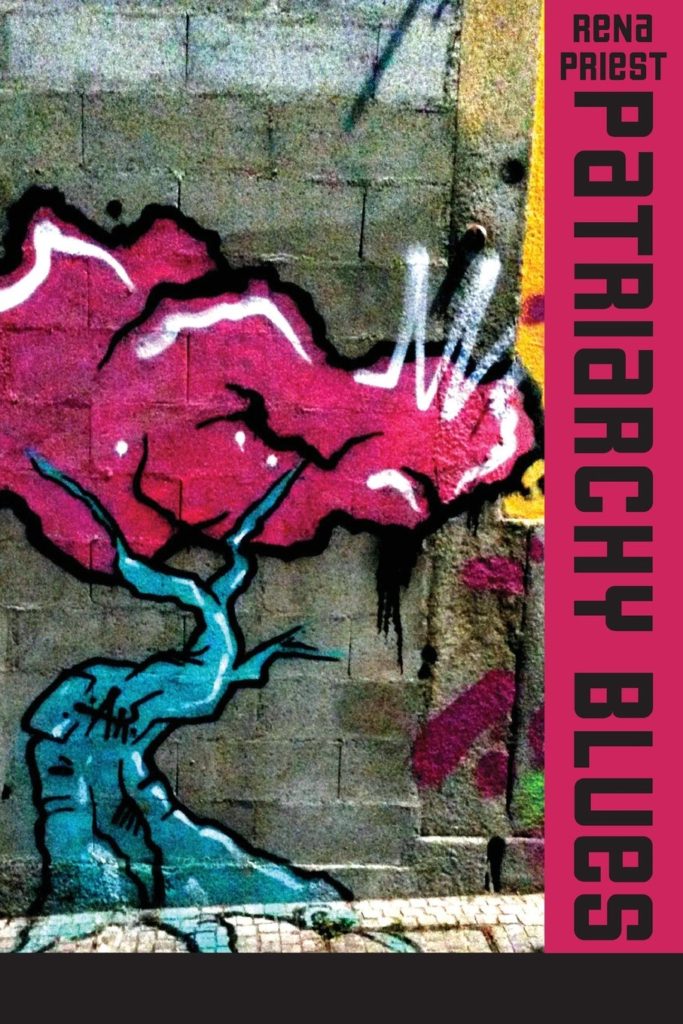
This Madonna-Whore binary is still very much a system to which we are subjected, and it dictates how we’re treated and what we have access to, and it’s important not to try to deny it, but what I also really try to explore in this collection are all the other beautiful places in a woman’s interior and how one comes by a sense of personal power in the midst of everything set out to deny it. In my life I’ve read so many books that give me the interior lives of men. I wanted to make one that offered the interior lives of women like me.
Love, autonomy, adventure, new experiences, career, wealth, freedom… These are things that seem so attainable at the get-go, before the obstacles are fully perceived. As a girl, I started out with a certain amount of savvy and style. As a woman I became a complex mix of selfish and accommodating; brutal and fragile; hard as winter and soft as baby fat, eternally resilient, while always at the very limit of my ability to deal. I started out as a master of everything within my gaze and reach, but then, immediately learned about the limits of both.
I saw that to go farther I had to break rules, take risks, and defy the messages that I was bad for straying from this, or that path, or for saying this or that thing that was acceptable from a man, but not from me (#theeffword). I think the fascinating place in a person’s awakening is the initial moment of doubt about the path. This is what I search for in these poems—the moment in the dream before the speaker awakens and their reach is expanded.
Rena, you are an incredibly joyful person (you’re giggling on the left in the photo below!) who also writes sad things. Your book references jazz — the ultimate combination of happy/sad feelings. What is joy to you? And where do you find it?
I would say I find joy in noticing the world—deeply noticing it, and just going along in awe at all of its minute and grand magnificence. I also find incredible joy in poets and artists and musicians who have shared their deep noticing of the world through their work. Profound joy and contentment come from doing the work as well. We humans, are truly amazing in our ability to love and experience beauty. I just feel like so much of what goes wrong in my life, and the world-at-large, is the result of not being open to the poetry that exists in any direction we point our gaze.
There’s this quote by Kafka that I’ve always loved: “You do not need to leave your room. Remain sitting at your table and listen. Do not even listen, simply wait, be quiet, still and solitary. The world will freely offer itself to you to be unmasked, it has no choice, it will roll in ecstasy at your feet.” I feel like this has been my experience. It brings me great joy when I can sit still enough, for long enough to let that ecstatic world in. In that state you can fall in love with the trajectory of a dust particle or the reassuring creak of your neighbor’s footsteps upstairs.
I also find joy in the people in my life. My daughter is hilarious. She’s like joy factory, and I’m very fortunate to know some great writers who are also amazing people. I feel like this work has brought me community, love, a sense of self, and many other gifts. I feel very fortunate to have poetry as part of my life’s work. Maybe joy is the product of gratitude and work.
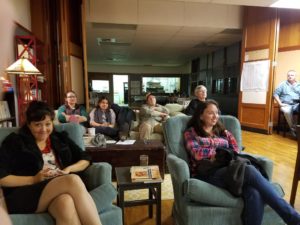
What poets do you admire these days and why?
Lately, I find myself going back to Naruda, Lorca, and Emily Dickinson. I think I like to feel the certainty of the beauty and worth in poetry that they make me feel. When I read these poets, I never have any doubts about the vitality and essential nature of poetry. They make me see that poetry is the air the soul breathes. I feel like the world tells me to focus my attention on serving this or that cause above another, and whenever I have to focus my attention on earning a living or participating in community activism, I immediately feel a need to keep the poetry hooked in like an IV drip or an oxygen mask.
I’m also in love with Kenneth Patchen right now. I’ve been reading, “We Meet.” On any page you open this book to, a line pops out at you like, “In the caress of shapes, colors, immaculate appearances… O we are surrounded with enchantments.” I’ve also been digging Kendrick Lamar. He’s a rapper, but he’s also definitely a poet. The way he puts words together to give you a feeling about what he’s saying has made me cry real tears. And then on the other end of it, for the pure sensory delight of the words themselves, I always feel the tingle when I read Gertrude Stein.
She’s actually the second poet who convinced me I wanted to do this thing. The first was Shel Silverstein. When I was a child I loved rhymes. (I still love rhymes.) And I loved Shel Silverstein. (I still love Shel Silverstein.) Anyway, in the second grade, I got the flu and had to stay home from school. My mom picked up my school assignments and one of them was to write down some words that I associated with springtime. I had a high fever and I think I might have been a little on fire because instead of just writing springtime words, I made them into a little poem that had like maybe six lines, and rhymed. My teacher sent it to the paper and they published it. I was so proud.
To her horror, I told my mom I was going to be a poet when I grew up. She said, “How about a lawyer?” I still get a kick out of the fact that somehow I was able to stay true to the dream of my seven-year-old self. In high school a friend gave me a copy of Tender Buttons, and Gertrude Stein ignited my love of poetry in a new way with her radical way of making language delicious. Reading her makes me feel like I’ve rediscovered the sensation of existing in a preverbal state. I sometimes like to watch foreign films without the subtitles because it makes me feel the nuance and music of the language without the baggage of meaning attached to it.
The way Gertrude Stein uses language has always had a similar effect with the added layer of meaning attached to individual words and phrases, which ultimately don’t need to mean more than what they are at the moment they’re existing in. It’s wonderful; it’s the best actually, and it’s helping me in the work I’m generating right now. Letting go of the inhibitive commitment to being understood opens up space for me to be able to do new and exciting things in the work and just say, you don’t have to understand it to like it. Just enjoy it for the way it sounds or feels. I feel like that’s a good message to support right now when the world doesn’t really make any sense but needs some assurance that it’s okay to just be alive and enjoy it.
At Mineral, you were writing prose — characters’ dialogue often involved their telling stories to one another. Do we talk in stories, and do you admire essays and fiction that reflect this tendency?
In my family we definitely talk in stories. My mother is one of eight children, and at family gatherings, we always share stories, so many funny and beautiful stories. Every year on my birthday, my mother tells me the story of the day I was born, even if she just calls me up to tell me happy birthday, she sneaks it in there.
One of the things that people loved about my brother was how he talked in stories. He always had the funniest stories about people. It revealed his worldview and his sense of humor and his love for the subject of his yarn. The focus of the details and the narrative line all give you a sense of the storyteller’s mind. He had a unique mind. Nobody could tell it like he could. Now he’s gone and those stories are gone too, and with them a little bit of a sense of who we are.
At Sarah Lawrence I took an Oral History course and an EMT who was a first responder at the World Trade Center came to talk to us about his experiences. He said that one way they keep trauma patients from going into shock is by having them tell the story of what happened. It helps them to process the trauma and keeps them aware of where they are in time.
I can’t say I’ve noticed any writers in particular using dialogue to ‘talk in story,’ but Coast Salish tribal cultures have a strong oral tradition. In a way this gift of using story as dialogue is a way of staying tethered to identity and history in the storm of time and events. It involves memory and the active shaping of meaning and reality. I don’t have the gift of oration, but stories show up in my dialogue in way that is similar to how I hear people speak in my community.
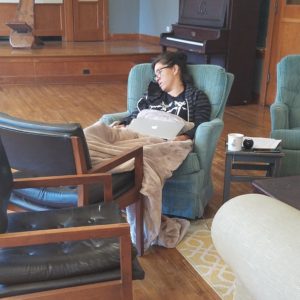
Your biography mentions you’re a “concerned citizen.” It seems many poets are activists. Do you feel that the poet’s job is to serve as an activist, or do you feel your concerned citizen efforts are separate from your identity as a poet?
I feel like the poet’s job is to produce the work. It just seems that as the world “offers itself to you to be unmasked,” you end up writing about things that incite people to put you in a role of speaking to a cause. Part of deeply noticing the world is noticing injustice, and then part of deeply noticing it is feeling the sting of it, and once it’s felt, it’s harder to turn away from it, so you bear witness or speak to the difficult questions raised in you by what you’ve observed in some aspect of life. I never intend to have my concerned citizen efforts show up in the work, but it’s inevitable. Otherwise, I’m not being true to my voice and then I’m not really producing the work. (That’s Rena at right as a tuckered citizen!)
What’s next for you as a writer?
I’m working on a new collection about liminal spaces, and places in our lives where we wait. The Catholic mystics have this poet, St. John of the Cross, who wrote this poem called Dark Night of the Soul about the pain endured in spiritual growth. I interpret it as a description of a living purgatory. I’ve been feeling like my hometown where I live is a bit of a purgatory, as is the emotional space where I’ve been living, so I’ve been writing poems about purgatory, but I’ve been trying to keep a sense of humor about it.
The poems are an expression of love for the physical world through imagery and sound. Many of them are not meant to have meaning attached to them as much as they are meant to create an experience for the reader. It’s how I feel about the world right now. As in life, and the dark night, the poems don’t always make sense, but I want to give my reader the feeling that there is some underlying formula involved, and I want to anchor them with images.
I’m also working on a memoir, but prose isn’t really where I came up, so I’m putting energy into way-finding there. I’ve attempted NaNoWriMo for several years and have hit the 50,000 word mark twice. I’ll be attempting it again this November because I find it’s a really good practice for me, and I learn a ton about writing through the process.
Anyway, I have all these plans and say all this as if I know what’s next, but what I know about myself as a writer is that it’s hard for me to predict where the work will end up. I set out in a direction and I think I know where I’m going and then I find myself somewhere completely different. It’s okay though because usually, it’s better than where I thought I was heading.




